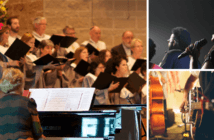Research on rapidly growing churches helped Matt Miofsky and Jason Byassee understand that miracles are happening in all our churches and communities all the time. Some churches and church leaders live and work and act like they believe this, and others don’t. This distinction makes all the difference.
Talking to pastors of rapidly growing churches, we noticed a pattern. Somewhere, at some point, these churches experienced things that most churches only dream about. A gift of land is given to a church needing a permanent home. A leading area musician walks through the door of a church that has been praying for better worship music. A highly qualified, bright, passionate, talented, and faithful person gives up their well-paying full-time job to commit their energy to the church. The area newspaper does a major story at just the right time. We could keep going. But the point is this: at some early stage, these churches had a miracle in which the Holy Spirit showed up in a surprising, unexpected, game-changing way.
When I share this observation with other pastors, the initial reaction is often exasperation. After all, we cannot manufacture miracles. We can pray, sure. We can hope. But we can’t make miracles happen. If church growth is dependent on the surprising, miracle-producing work of the Holy Spirit, then that leaves us pretty helpless. Or so we might think. As you know, the Spirit blows and we know not where it comes from or where it goes.
Miracles are happening everywhere
But then something happened. I started thinking more about these miracle stories from rapidly growing churches. I started to reflect on the miracles I have experienced at The Gathering. I started talking to pastor friends whose churches may not be on the fast-growing list but nonetheless could name miracles that God was doing in their midst, and I discovered that this idea does not leave us helpless. What I discovered is that miracles are happening everywhere. In small towns and big cities, in wealthy churches and poor ones, in multisite megachurches and in rural four-point charges, miracles are happening. Here is the difference. Some churches and church leaders live and work and act like they believe this, and others don’t. This distinction makes all the difference.
Believing that God is up to something is a game-changing decision
Acting as if we believe that the Holy Spirit is up to something in our midst is the single greatest game-changing decision a church leadership team can make. The growing-church pastors we interviewed believed that God was up to something, that God was going to do something significant. They were determined to be a part of it. Acting as if the Spirit is moving changes everything.
For starters, we discovered that churches that believe in the miraculous movement of the Holy Spirit pray fervently, specifically, and boldly. Jorge Acevedo tells a story about something that occurred shortly after he was appointed to Grace Church, which was at the time a traditional United Methodist Church in Florida. He had a strong belief that God was going to use the church to reach people who are disconnected from Christ. Believing this, he decided to start a contemporary worship service — at the time a risky and controversial step.
He was launching a contemporary service in a traditional place. The morning of the first service, he was standing in the new space when someone said to him, “It’ll never work.” But he spent that early morning praying over every chair and over every new person who came, praying that the Holy Spirit would produce a miracle. He went back into his office to prepare for worship. When he came out, 261 people were gathered for worship. He describes it as his Pentecost moment. More important than the number, though, was the habit: they were going to pray for the Holy Spirit to work, expect that the Holy Spirit would work, and prepare for the miracles that the Spirit wanted to do in their midst.
We act boldly when we expect God to work miracles
When we believe that God is up to something, even in our context, we pray differently, we see differently, and most importantly we begin to act differently. This is perhaps why this virtue matters so much. In the rapidly growing churches we studied, a belief in the miracle producing work of the Spirit led them to not only pray, to not only see, but ultimately to act. Such churches consistently make big bets and bold moves that other churches are afraid to make because they believe that the Spirit is at work. The Spirit prompts them to act more boldly. And if you want to get results that most churches don’t get, you need to be willing to make decisions that most churches won’t make.
We must act boldly. We must act as if we expect God to do miracles. We must try things that, if God is not real, will almost certainly fail. The more boldly we act, the more likely we are to see miracles happening
This material is excerpted from 8 Virtues of Rapidly Growing Churches (Abingdon Press, 2018) by Matt Miofsky and Jason Byassee. Used by permission. The book is available at Cokesbury and Amazon.
Related Resources
- Discovering God’s Future for Your Church Video Tool Kit
- Take the Next Step: Reaching More People, Younger People, More Diverse People, free video resources from the Lewis Center
- Unsticking a “Stuck” Institution by Amy Butler






